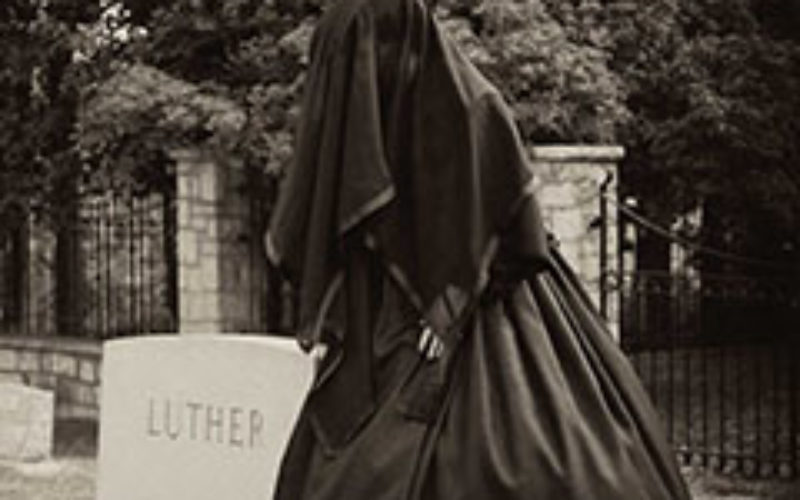Widow wails on stage 150 years later
JOCELYN MURPHY
jmurphy@nwadg.com
The team that has been touring the award-winning folk show “There Ain’t No More” across the country the past two years is back in Fayetteville Nov. 16-17 with a new show that is a complete departure from the “dying folk singer” who plays the banjo and tells dirty jokes. “A Confederate Widow in Hell” is the new venture from Willi Carlisle and Joseph Fletcher of lauded theater company Breaker/Fixer Productions, and it challenges viewers to confront how one of the most terrible periods in our country’s past might still affect them today.
When Carlisle came upon a photo of a recent Confederate monument protest in Hot Springs, and noted the women counter-protesters dressed in full period mourning gowns, the wheels immediately began turning for the two creators.
“It just screams that this is something we’re still dealing with — and figuring out what our heritage means,” Fletcher says of the dramatic image.
Using an immense amount of research — including primary sources — a narrative tale, haunting characters, music and a bit of irreverent comedy, Fletcher and Carlisle aim to take audiences on a journey of self-reflection in coming to terms with the ghosts of our nation’s past, a journey much like the duo experienced.
“The reason we need to hear her story is because we primarily have a relationship with the Civil War and its history that is focused on male experiences in war, and that’s an experience that gets glorified in reenactments, in textbooks, etc.,” Carlisle offers. “I think there’s a hidden history of the war that’s tied to labor exploitation and the birth of globalism that isn’t often explicated. [The show] uses recent scholarship and sort of smashes [that] up against primary source research, which, to us, is a fascinating thing to have happen on stage because it makes what could be difficult connections into a story. It also means that this character, this human being that’s the on stage, this Confederate widow in hell, isn’t 100 percent a miserable, awful person. She has feelings like the rest of us; she has guilt.”
“And her motivations are tied into very [relatable things],” Fletcher adds. “It’s just the means by which she goes about obtaining her hopes and dreams that are really quite horrible.
“It’s sort of this double thing of challenging the viewer — us modernly, what’s our culpability? But also trying to point the finger at her, too,” Fletcher goes on. “And that’s part of why it’s relevant right now. Of course there’s the political discourse going on, and I think a lot of people don’t understand where that came from and why. I feel like a lot of the people who engage in that ideology now have a disconnect from their own history. They’re fed a different narrative that it was better back then, that it was this glorious thing, and they’re just worried about themselves. They’re not thinking wider about it — in the same way that the widow [doesn’t]. All we want to do is challenge people to think about their history and what their culpability and their involvement in it is, and [reach an] understanding why we are where we are today because of it.”
__
FAQ
‘A Confederate Widow in Hell’
WHEN — 8 p.m. Nov. 16-17
WHERE — Fenix Fayetteville at 16 W. Center St.
COST — $15
INFO — breakerfixer.com



